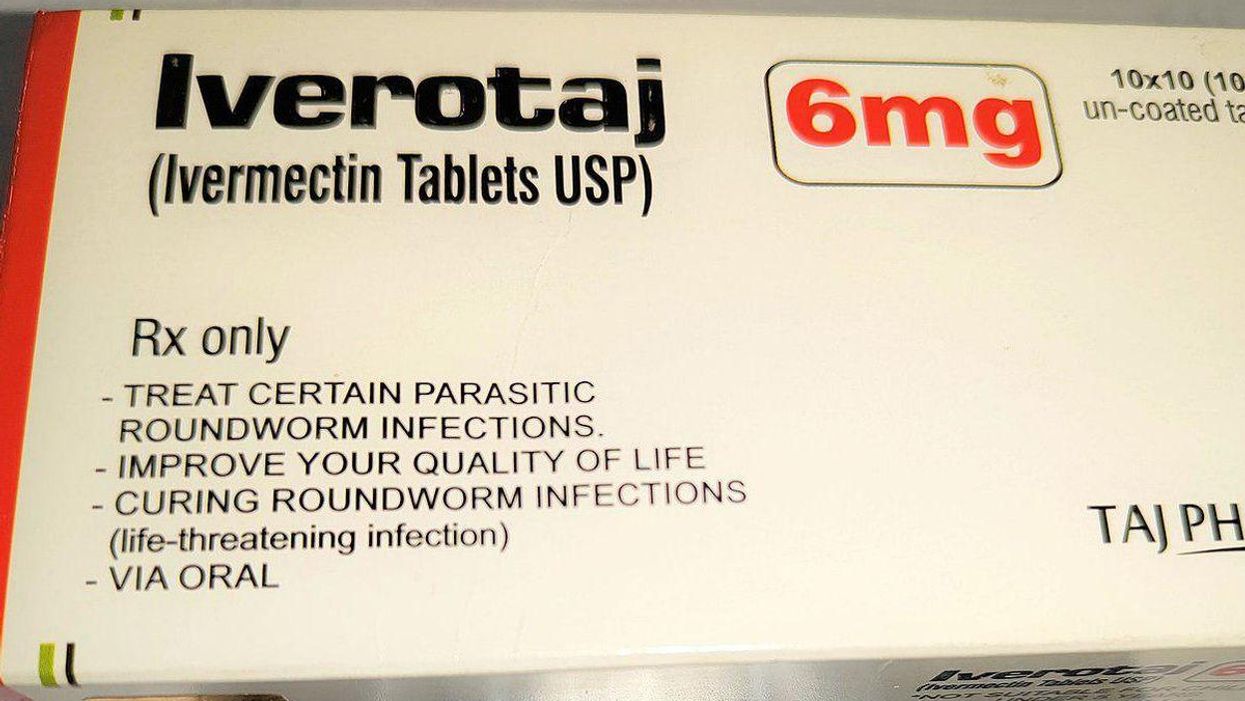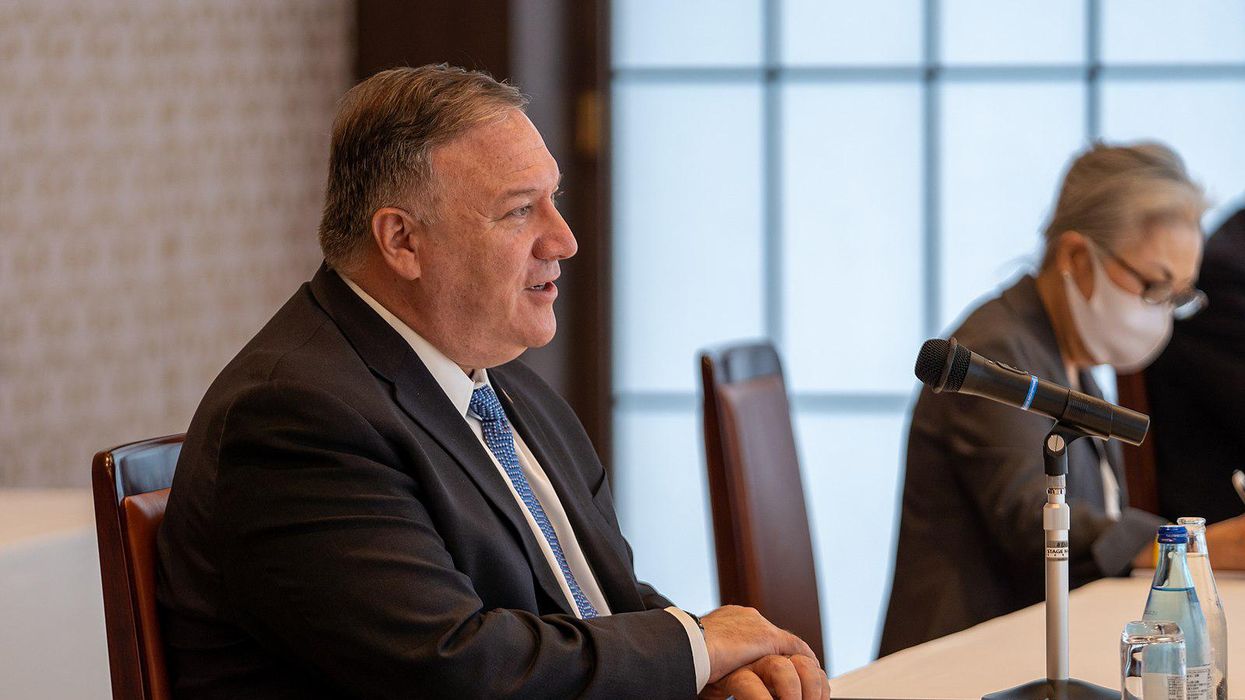Reprinted with permission from Daily Kos
Everyone wants the same thing when it comes to COVID-19: A cheap, effective, reliable treatment that can be easily administered to anyone who shows symptoms, with good assurance that they'll quickly recover. There are existing treatments for COVID-19 in the form of monoclonal antibody treatments from Regeneron Pharmaceuticals and Vir Biotechnology, but those treatments are expensive, difficult to administer, and available in limited quantities. Unless those factors change, these treatments will never become the kind of panacea we need.
If there was something that could be packaged into a pill, or even an EpiPen-style injectable, and handed to everyone as soon as they received a positive test for COVID-19, it would be great. Every health professional wishes that hydroxychloroquine had turned out to be that safe and effective treatment. It just didn't. Every health professional wishes the same about ivermectin. Widely available? Check. Easily administered? Yes. Safe and effective? Well …
For months, fans of ivermectin persuaded by online enthusiasm have been pushing the anti-parasitic based on the same kind of evidence that was once behind the hydroxychloroquine buzz: small, non-clinical "trials" that mostly consist of anecdotal results from a single doctor or proactive. More recently, there have been supposed "metanalyses" that, unfortunately, have lumped a lot of low-reliability data together and given it a veneer of respectability. Some of those involved in these studies have even been invited to the Senate as guests of Republicans, where they have claimed ivermectin is 100 percent effective in stopping COVID-19, and included completely false data to create the impression of a "wonder drug."
The claims about ivermectin have been so pervasive—and apparently, so persuasive—that they've made regular appearances in Daily Kos comments. Doctors are being pushed to prescribe the stuff by patients who refuse to accept other treatment unless they're first given ivermectin. And the refusal to accept the truth about ivermectin is costing lives.
Here's the truth about ivermectin: It's a widely prescribed drug used in treatment of parasites in both humans and animals. With proper dosages and duration of treatment, it has a very good safety record, and it is extremely effective at treating everything from common roundworm to the parasites that carry river blindness.
If someone is getting ivermectin in normal doses, using genuine pharmaceutical-grade drugs that don't contain ingredients not meant for human consumption (many veterinary formulations do have such ingredients) and sticking to the standard timeline of treatment, they are unlikely to suffer lasting harm. As with almost any drug, ivermectin has common side effects: skin rash, nausea, stomach pain, vomiting, and diarrhea. It also has some rarer side effects, including severe liver damage. If you need ivermectin because you are facing a parasite for which it is the standard treatment, take it.
Here's the other truth about ivermectin: If it has any positive effect on the treatment of COVID-19, that effect is small, difficult to detect, and far from universal.
How is it possible to know this? Because the National Institutes of Health have compiled a list of studies on the use of ivermectin in the treatment of COVID-19. What that list shows, over and over again, is results such as this:
- "A 5-day course of IVM did not improve time to resolution of symptoms in patients with mild COVID-19."
- "A 5-day course of IVM in hospitalized patients with severe COVID-19 did not result in clinical improvement at the end of treatment, and no reduction in mortality was observed."
- "Use of IVM did not reduce risk of oxygen requirement, ICU admission, invasive mechanical ventilation, or death in hospitalized patients with severe COVID-19."
- "IVM showed no effect on symptom resolution in patients with mild COVID-19."
- "Compared to SOC, use of IVM did not lead to faster recovery from mild to moderate COVID-19."
- "Patients who received IVM showed no difference in viral clearance compared to those who received placebo."
- "In hospitalized patients with COVID-19 pneumonia who were not critically ill, neither IVM nor HCQ decreased the number of in-hospital days, rate of respiratory deterioration, or mortality."
Several of these were studies where the original authors suggested that there had been positive effects from treatment with ivermectin, but these effects disappeared on closer analysis from researchers at the NIH.
Among the list of studies, there are a handful that do appear to indicate positive results.
- A study that supposedly demonstrated that ivermectin combined with doxycycline was a superior treatment to hydroxychloroquine and azithromycin, but the actual results showed no statistical difference or evidence that either treatment was an improvement over standard of care.
- A very small study showed some evidence that the level of virus was reduced when ivermectin was given at three times the normal dose.
- Another very small study indicated that ivermectin shortened hospital stays, but didn't have a placebo group or consider co-morbidities.
- Another very small study indicated that a handful of patients had reduced hospital stays, but the number being treated was so small it easily could have been a statistical fluke.
- The best of the studies showing some durable positive result involved about 250 patients, with a lowering of both hospital stays and mortality after a single dose of ivermectin.
And that's pretty much it. That's what the real literature has to show when it comes to studies, including most of those in pre-print that have not faced peer review. That handful of positive results is enough that the NIH is continuing studying the effectiveness of ivermectin and working it into a large trial. The U.K. is also adding ivermectin to its massive RECOVERY trial.
Either of these trials, or other large trials going on around the world, may find positive benefits from ivermectin. But those benefits, if they exist are going to be marginal, not miraculous. We know that, because that's what the data—positive and negative—already makes clear. In addition to the data examined by the NIH, the World Health Organization reviewed available data and indicated that there was "very low certainty" of any net positive effect from ivermectin.
Of course, this result doesn't match what's circulating widely in social media, and even on broadcast media. That includes how Japan has supposedly seen such good results from ivermectin, they've made it standard of care for all COVID-19 patients. Except they haven't. As NHK World reports, Japan's ministry of health has placed ivermectin "in a category of drugs whose efficacy and safety have not been established." A quick Google search on Japan will bring up studies like this one titled "wonder drug from Japan," but it refers to how the treatment was originally extracted from bacteria located near a Japanese golf course—and earned its discoverer a Nobel Prize. Ivermectin really is very good against parasites.
What about [Insert Country Here]? The answers in most cases are the same as in Japan. There are some countries, particularly in South America, which have authorized the use of ivermectin against COVID-19. Those authorizations appear to be connected to a study that came from Argentina. That study, referenced by many of the positive "meta analyses" as well as figures like vaccine skeptic Joe Rogan, indicated that ivermectin was that dream drug: easily administered, almost universally effective, and safe.
However, as BuzzFeed makes clear, there are some problems with that study. In fact, that study is nothing but a problem. That includes the study taking place at a hospital that says it never happened, along with basic patient data that changes from page to page. The researcher behind the study refuses to share notes or data.
In short, it doesn't look like the study was just badly put together. It looks like it was completely fabricated. And this is the study. The one that's been cited over and over as the justification for going all in on ivermectin.
There have also been claims, including testimony before the Senate, that Peru added ivermectin to its standard of care and immediately saw a decrease in COVID-19 cases. Only that testimony has the timeline completely backward. When it comes to ivermectin, Peru is where America is now back in the fall of 2020. That's when Naturereported on how rumors and false claims had driven a nationwide fury for ivermectin. Doctors could not prescribe it fast enough. Thousands of doses of animal-grade ivermectin were seized from smugglers. So many people were taking ivermectin that one researcher had trouble beginning a controlled trial. "Of about 10 people who come, I'd say eight have taken ivermectin and cannot participate in the study."
All of this came before cases in Peru soared. The same is true of Bolivia. The same is true of Guatemala. Widespread use of ivermectin in all these countries did not stop them from experiencing massive spikes in disease, hospitalizations, and deaths.
Finally, ivermectin in the U.S. has been pushed heavily by groups like Front Line COVID Critical Care (FLCCC), who are—and this is putting it mildly—scam artists. Before they were handing out scripts for ivermectin, they were all in on pushing hydroxychloroquine. Before that, their founder was busy explaining that ovarian cysts were caused by demon sperm. In this pandemic, FLCCC is nothing but war profiteers of the worst kind and the disinformation and propaganda they are spreading, including attacks on the FDA and NIH, are designed to generate false hope of a miracle cure for the purpose of lining their pockets.
The idea that any treatment is being suppressed by some coalition of U.S. government agencies, the World Health Organization, and the health care agencies of practically every nation on the planet is a conspiracy theory. If there was evidence of ivermectin's efficiency, it would be used. It's not used because there is no such evidence.
It is not being held back because it's cheap and other treatments are expensive. Ivermectin actually costs more than any of the available vaccines. Other treatments, like anti-inflammatory steroids, have become part of standard of care exactly because they have proven effective.
If ivermectin works against COVID-19 at all, its value will almost certainly be marginal. That's okay. Almost every drug that comes to market is of marginal, and sometimes picayune, benefit. If taking ivermectin provides even a small benefit in protecting COVID-19 patients, it will become part of the standard of care. That's how this works.
That doesn't mean there isn't a conspiracy that's killing those infected with COVID-19. There is. It's the one pushing ivermectin as a miracle cure. That false idea is getting people killed.
I wish that wasn't the case. The FDA wishes that wasn't the case. Joe Biden and Anthony Fauci and every doctor in every ICU in America wishes that wasn't the case. But it is.




